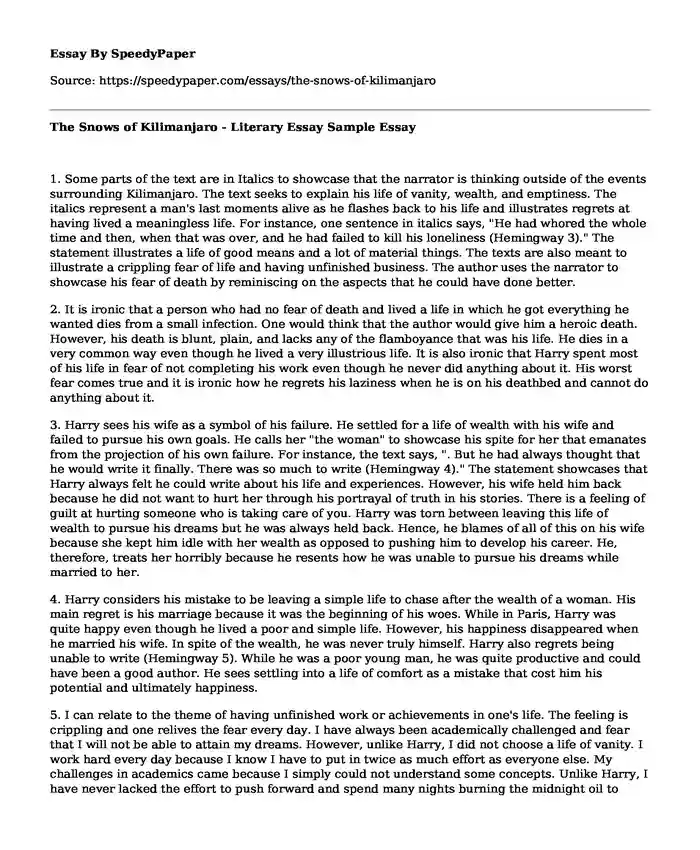
| Type of paper: | Literature review |
| Categories: | Ernest Hemingway Modernist literature |
| Pages: | 3 |
| Wordcount: | 730 words |
1. Some parts of the text are in Italics to showcase that the narrator is thinking outside of the events surrounding Kilimanjaro. The text seeks to explain his life of vanity, wealth, and emptiness. The italics represent a man's last moments alive as he flashes back to his life and illustrates regrets at having lived a meaningless life. For instance, one sentence in italics says, "He had whored the whole time and then, when that was over, and he had failed to kill his loneliness (Hemingway 3)." The statement illustrates a life of good means and a lot of material things. The texts are also meant to illustrate a crippling fear of life and having unfinished business. The author uses the narrator to showcase his fear of death by reminiscing on the aspects that he could have done better.
2. It is ironic that a person who had no fear of death and lived a life in which he got everything he wanted dies from a small infection. One would think that the author would give him a heroic death. However, his death is blunt, plain, and lacks any of the flamboyance that was his life. He dies in a very common way even though he lived a very illustrious life. It is also ironic that Harry spent most of his life in fear of not completing his work even though he never did anything about it. His worst fear comes true and it is ironic how he regrets his laziness when he is on his deathbed and cannot do anything about it.
3. Harry sees his wife as a symbol of his failure. He settled for a life of wealth with his wife and failed to pursue his own goals. He calls her "the woman" to showcase his spite for her that emanates from the projection of his own failure. For instance, the text says, ". But he had always thought that he would write it finally. There was so much to write (Hemingway 4)." The statement showcases that Harry always felt he could write about his life and experiences. However, his wife held him back because he did not want to hurt her through his portrayal of truth in his stories. There is a feeling of guilt at hurting someone who is taking care of you. Harry was torn between leaving this life of wealth to pursue his dreams but he was always held back. Hence, he blames of all of this on his wife because she kept him idle with her wealth as opposed to pushing him to develop his career. He, therefore, treats her horribly because he resents how he was unable to pursue his dreams while married to her.
4. Harry considers his mistake to be leaving a simple life to chase after the wealth of a woman. His main regret is his marriage because it was the beginning of his woes. While in Paris, Harry was quite happy even though he lived a poor and simple life. However, his happiness disappeared when he married his wife. In spite of the wealth, he was never truly himself. Harry also regrets being unable to write (Hemingway 5). While he was a poor young man, he was quite productive and could have been a good author. He sees settling into a life of comfort as a mistake that cost him his potential and ultimately happiness.
5. I can relate to the theme of having unfinished work or achievements in one's life. The feeling is crippling and one relives the fear every day. I have always been academically challenged and fear that I will not be able to attain my dreams. However, unlike Harry, I did not choose a life of vanity. I work hard every day because I know I have to put in twice as much effort as everyone else. My challenges in academics came because I simply could not understand some concepts. Unlike Harry, I have never lacked the effort to push forward and spend many nights burning the midnight oil to overcome my weaknesses. Therefore, I understand the ending to be a lesson to everyone. The story seeks to encourage individuals of the need to work hard while they still can or have the ability to do so. Postponing dreams is the worst form of betrayal to oneself.
Works Cited
Hemingway, Ernest. The snows of Kilimanjaro and other stories. Simon and Schuster, 1995.
Cite this page
The Snows of Kilimanjaro - Literary Essay Sample. (2022, May 26). Retrieved from https://speedypaper.net/essays/the-snows-of-kilimanjaro
Request Removal
If you are the original author of this essay and no longer wish to have it published on the SpeedyPaper website, please click below to request its removal:
- Linguistics Essay Example: Language and Variation
- Behavioral Psychology Essay Sample
- Dentistry Essay Sample: Epidemiology and Etiology of Tooth Extraction
- Essay Sample on the Topic: How Technology Affects Business
- Free Essay Describing Social Change Project
- Free Essay Sample on Diagnosing and Treatment of Neuropathic Pain
- An Occurrence at Owl Creek Bridge by Ambrose Bierce. Paper Example
Popular categories




